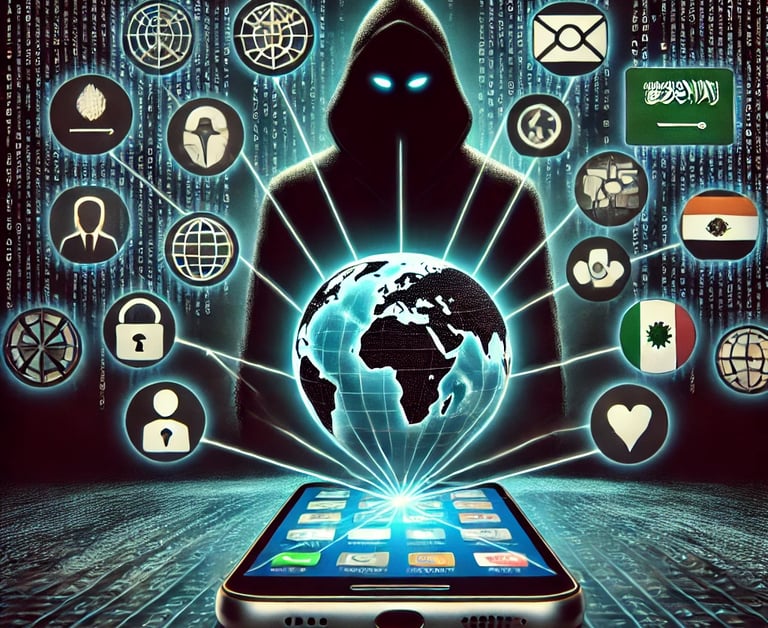The Tool You Carry: The Cyber Weapon in Your Pocket
Pegasus
BLOGS


Imagine a tool so powerful it can infiltrate your smartphone without you clicking a single link, turning it into a 24-hour surveillance device. This spyware watches every step you take, every photo you make, your browsing history, messages—even your current location—and you won't ever feel it. This is the disturbing reality of Pegasus, an advanced malware tool developed by the Israeli cyber intelligence company NSO Group. Originally made as a weapon to combat terrorism and serious crime, Pegasus has fast demonstrated itself to be the dark side of technology.
The Birth of Pegasus and Controversial Use
Pegasus was launched in 2010 with the promise of helping governments fight against terror. However, its use has been heavily extended far beyond its original purpose. This spyware can exploit vulnerabilities in all smartphones, iOS and Android, allowing the infiltrator to gain practically all the data stored on the device. This includes sensitive information such as personal messages, photos, contacts, browsing history, and real-time location data. Pegasus can turn the phone into an always-on surveillance tool by activating its microphone and camera.
The first major public attention to Pegasus came with the tragic events in Iguala, Mexico, in September 2014, when 43 students from Ayotzinapa Rural Teachers College went missing. Within days, the Mexican government released an official explanation stating that the disappearances were related to violence caused by drug cartels. However, the report was discredited weeks later. Investigative journalism by Carmen Aristegui and her team suggested possible government complicity. They reported receiving suspicious messages targeted by Pegasus through weaponized links intended to infect their devices.
In 2017, the situation escalated further when Javier Valdez Cárdenas, a respected journalist reporting on drug cartels, was murdered. His widow and colleagues later received similar Pegasus-linked messages, highlighting that the spyware was used not just by state actors but potentially by organized crime.
Global Reach and Widespread Abuse
Citizen Lab, a research group based at the University of Toronto, has been instrumental in exposing the misuse of Pegasus. Their investigations revealed that the spyware has been used in at least 45 countries, targeting over 600 politicians and government officials, 64 business executives, 189 journalists, and 85 human rights activists. Notably, even high-profile figures such as the French President were allegedly targeted.
In self-defense, the NSO Group has consistently claimed that Pegasus is sold only to governments with good human rights records. The reality, however, seems different. Countries with notorious human rights records, such as Saudi Arabia, the United Arab Emirates, and Hungary, have been implicated in the abuse of Pegasus. These regimes use spyware to monitor and suppress activists, journalists, and political opponents. This technology's potential for life-threatening misuse was demonstrated in the high-profile assassination of journalist Jamal Khashoggi and the wave of attacks targeting his associates.
Mechanics of Pegasus
One of the most disturbing aspects of Pegasus is its capability to execute zero-click attacks. Traditional malware often relies on tricking a target into clicking a link or downloading a file. Pegasus, however, can infiltrate a device without any user interaction, exploiting zero-day vulnerabilities—previously unknown faults in the software. Once infiltrated, Pegasus grants full access, allowing an attacker to read encrypted messages, listen to calls, and track the user's movements.
The sophistication of Pegasus includes a stealth feature; the spyware can self-destruct if it detects an attempt to remove it, making it difficult to trace or study. This self-destruction capability precludes forensic analysis and eliminates any evidence of the infection.
Legal Battles and The Global Backlash
The global community has not remained silent in the face of Pegasus's misuse. In November 2021, the Biden Administration took the unprecedented step of blacklisting the NSO Group, recognizing the threat posed by the company’s technology to national security. This decision has had significant ramifications for NSO's operations, limiting its access to American technology and services.
Legal battles have also intensified. WhatsApp, a subsidiary of Meta (formerly Facebook), launched a lawsuit against NSO Group, alleging that Pegasus targeted 1,400 of its users. In early 2024, a U.S. court ordered NSO to hand over critical documents and source code related to Pegasus, marking a significant step in holding the company accountable. Apple has also joined the fray, filing a lawsuit asserting that NSO violated computer fraud laws. Apple is not stopping at litigation; they are actively developing new security measures, including a "lockdown mode" designed to protect users from sophisticated threats like Pegasus.
The Broader Implications and Future of Surveillance
The case of Pegasus raises profound ethical and legal questions about the role of surveillance in society. While NSO Group and similar companies argue that such tools are necessary for national security, the potential for abuse is immense. In the wrong hands, spyware like Pegasus becomes a weapon for controlling political discourse, intimidating opposition, and infringing on fundamental human rights.
The pervasive nature of this technology forces a reckoning with our understanding of privacy and freedom. The psychological toll on victims, who are often unaware of the surveillance until it is too late, can be severe, leading to fear, self-censorship, and a chilling effect on free expression. Moreover, the normalization of such invasive tools by governments undermines democratic principles and erodes trust in public institutions.
Protecting Yourself in the Digital Age
Given what spyware such as Pegasus is capable of, the risks are probably impossible to fully guard against. Still, there are measures one can undertake to minimize them. Be extremely alert to unsolicited messages, avoid clicking links from strangers, stay away from unsecured public Wi-Fi, and use robust antivirus programs to safeguard personal data.
The Pegasus saga does not end there. Technological capabilities never stay constant; they are always evolving. This means that surveillance tools also improve. It, therefore, demands that the global community establish clear guidelines and mechanisms to prevent the misuse of spyware. Companies like NSO Group should be held accountable for the use of their products, and there must be transparency in how these tools are applied.
